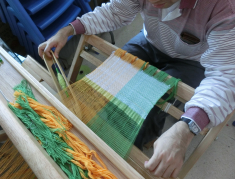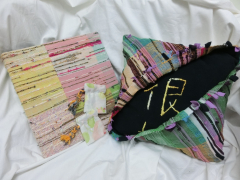Media
Press conference on “Reweaving Grief: An Innovative Bereavement Care”
06 Dec 2016

Project Director of Woven Memories, Australia, Ms Mary Burgess (back row, second on the left), together with (front row from the left) weaver of Reweaving Grief: Innovative Bereavement Care Ms Leung Hang-fong and service user Ms Hilda Cheung, display the unique keepsakes created by clothes and other fabrics of the deceased. Project coordinator, HKU Associate Professor Dr Amy Chow, is on the left of the back row. Ms Tsang Wing-yan and Ms Gallery Choi of TWGHs are the first and second from the right in the back row respectively.
The death of a loved one is usually considered a most painful experience. The number of deaths in Hong Kong increased from 38,683 to 46,757 in the past decade, thus there are more bereaved persons. Bereavement affects individuals and families in many different ways. In particular, bereaved persons struggle with the belongings left by the deceased. Keeping the belongings symbolizes the connections with the deceased, yet it reminds them about the loss.
The Department of Social Work and Social Administration of the University of Hong Kong (HKU) is committed to promoting and developing bereavement care. “Shan Bie”, the Chinese term for bereavement care which means good separation, was coined by Dr. Amy Chow, an Associate Professor of the Department. Recently, Dr. Chow, in collaboration with the Tung Wah Group of Hospitals (TWGHs), piloted the “Reweaving Grief” innovative bereavement counselling model in Hong Kong. This model originated from the Woven Memories initiative in Australia.
Ms. Mary Burgess, the Project Director of Woven Memories, said: “The project will work with people who have kept clothes and other fabrics belonging to family members who have died. We will use these items to create unique keepsakes. Each piece of clothing will be taken apart and then handwoven into such things as cushions, bags, table mats or blankets - holding memories of loved ones.”
She also shared one of her reweaving experiences, “A pregnant woman who lost her father felt sad that her daughter would never meet her grandfather. The clothing of her father reminded her about this regret. By participating in the process of tearing and designing, she transformed two of her father’s shirts into a baby rug. Her regret is diminished as her father’s love is connected with her daughter through this transformed rug. Her daughter loved this baby rug so much that whenever she was covered by this baby rug, she could sleep peacefully. ”
Dr. Amy Chow called for those who are struggling with the clothing and fabrics belonging to join the pilot project, “Mary’s project is the first of its kind in the world. Adopting her method with cultural consideration, this project is expected to offer a new choice to bereaved persons in Hong Kong who do not prefer formal counseling. Participants have to select specific fabric belongings of the deceased and discuss with the social workers and designers of TWGHs about the possible new product. The participants are invited to join the unravelling and transformation process of the fabric belongings.”
She added: “The word ‘bereave’ means to strip or rob a person of a possession. The process of unravelling the fabric belongings of the deceased parallels with the bereavement process, and the transformation process directs the bereaved persons to a hopeful alternative in adjusting to the loss. The participants can express their emotions and experience new ways to connect to the deceased.” She also added “This also matches well with the leading bereavement theory of Continuing Bond, which states that maintaining a bond with the deceased, where appropriate, can have a positive effect. It helps them redefine the bereaved persons’ relationship with the deceased, so that they can regain strength to move forward.”
Ms. Gallery Choi, a TWGHs social worker, said: “At first, I was puzzled as to whether this Western model would be applicable to Hong Kong. Surprisingly, I discovered that most of the Chinese bereaved persons are not so conservative. As I learnt from Ms. Cheung, one of our participants, she considered belongings from her deceased mother as unlucky at the beginning. When she packed the belongings with her family, she found it difficult to let go of them. Eventually, they kept some as keepsakes. The process of sharing was a bittersweet process. The keepsake which Ms. Cheung selected for reweaving does not only connect Ms. Cheung with her deceased mother, it also connects everyone in the discussion, as if we had walked through the inner world of Ms. Cheung.” After the discussion, Ms. Cheung said: “I thought it was just a simple sharing process about the keepsakes, I had not thought of having such a deep talk. The sharing process helped me to get in touch with my deeper feelings and thoughts about my loss and it also helped me to review my bereavement experience, it is really a special and valuable experience.”
Ms. Mee-ling Yeung, the Assistant Superintendent of Jockey Club Rehabilitation Centre, TWGHs, said: “This project has another impact. Persons with disabilities are the ones who transform the products. Their participation supports the value of integration and flourishing of the persons with disabilities. We are glad to participate in this meaningful project.”
“Reweaving Grief” is a one-year pilot project, funded by the Knowledge Exchange (KE) Funding Scheme of HKU beginning in October 2016. It aims to develop and pilot test the feasibility of the new bereavement counseling approach. We have invited Ms. Mary Burgess, Dr. Amy Chow, and Ms. Gallery Choi as the speakers in this Press Conference. The service user of this Project, the social worker of i-dArt (TWGHs), and the weaver of this Project, will also attend the Press Conference to share their experience and thoughts about the Project.
For those who want to learn more about the Project, please register at https://goo.gl/lc3GJ2 for attending the Public Talk on “Reweaving Grief: An Innovative Bereavement Counseling Approach” on December 10, 2016 (Saturday). The Project also reserves a small quota of service for general public who are bereaved. For those who are interested, please call Miss Christine Yick of Tung Wah Group of Hospitals at 2884 2033.
For media enquiries, please contact
Ms. Vivian Kan, Department of Social Work and Social Administration of the Faculty of Social Sciences, HKU (Tel: 3917 5527; Email: stevian@hku.hk)
Ms. Rhea Leung, Communications and Public Affairs Office (Tel: 2857 8555/ 9022 7446; Email: rhea.leung@hku.hk)




